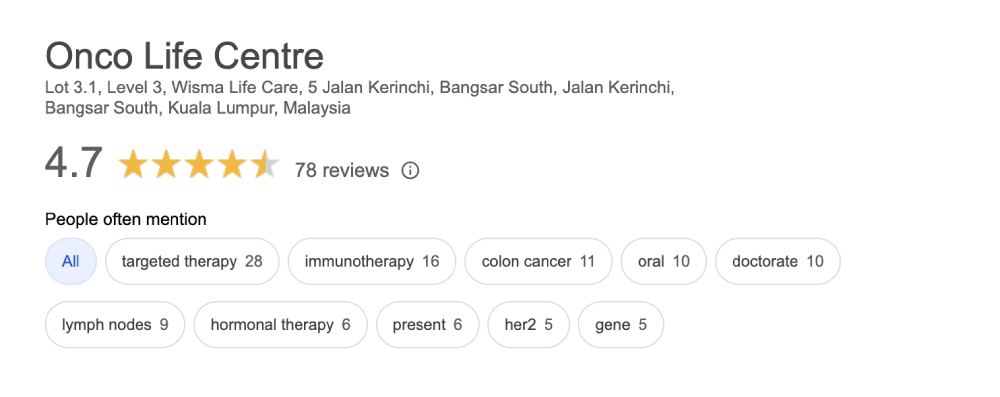

GISTs are different from more common types of GI tumors, like colon cancer or stomach cancer, because of the type of tissue in which they start. GISTs belong to a group of cancers called soft-tissue sarcomas. Soft-tissue sarcomas develop in the tissues that support and connect the body, including fat cells, muscles, nerves, tendons, joints, blood vessels, and lymph vessels.




Treatment recommendations by our cancer specialists at Onco Life Centre are tailored, personalized and depends on tumor stage, tumor genomics (KIT, PDFGRA, NTRK1-3 fusion, BRAFV600E, NTRK fusion, SDH and RAF), pre-existing medical conditions, your overall health and nutritional status.
Targeted therapy and immunotherapy is the foundation of precision medicine. Our Oncologists at Onco Life Centre work in close collaboration with Cancer Genomics Experts in the US to perform cancer gene mapping and DNA sequencing on our patients’ cancer tissue. Regular teleconferencing and live exchange of information with the US Genomics Experts allows our Oncologists to specifically design unique treatment plans for our patients. By targeting specific genes and proteins that are involved in driving cancer survival and progression, our patients at Onco Life Centre are experiencing significant and sustained improvements in their cancer responses and living longer.
At Onco Life Centre, we have made it our mission to improve the everyday lives of our patients. Our Oncologists and Pharmacists will seek to identify Compassionate Drug Access Programs that allows pre-approved new drugs outside clinical trials (and prior to product launch) for our patients who do not have satisfactory therapy options available.
For people with a localized GIST, surgery is the standard treatment and should be performed whenever possible. If the GIST cannot be completely removed by surgery, such as if it has spread somewhere else, it often cannot be cured.
Targeted therapy targets the cancer’s specific genes, proteins, or the tissue environment that contributes to cancer growth and survival. This type of treatment blocks the growth and spread of cancer cells while limiting damage to healthy cells. To find the most effective treatment, our oncologist will run tests to identify the genes, proteins, and other factors in your tumor. Read More ...
Before surgery, radiation can be used along with chemo to try to shrink some tumors to make surgery easier. After surgery, radiation can be used to kill very small areas of cancer that cannot be seen and removed during surgery. Radiation, especially when combined with chemotherapy (chemo), might delay or prevent the cancer from coming back after surgery and may help people to live longer. Radiation can also be used to slow the growth and ease symptoms.
Patients and their families have opportunities to talk about the way they are feeling with our oncologists, nurses, counselors, or join our psychosocial program and support group at Onco Life Centre.

